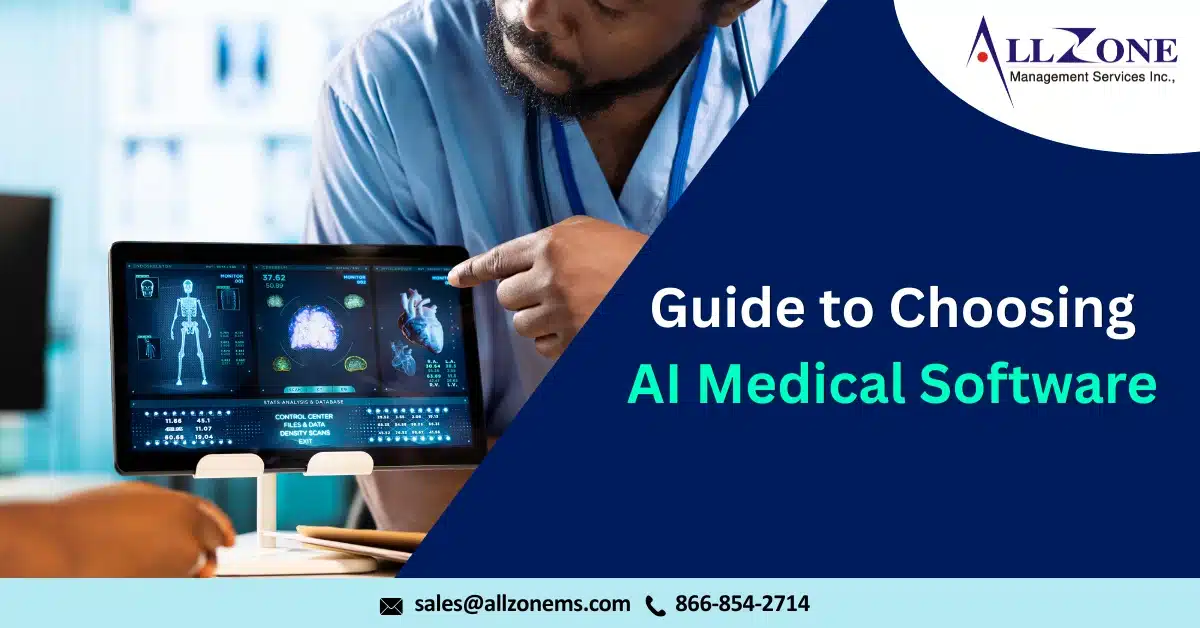Artificial intelligence (AI) is transforming AI Medical Software at a rapid pace. For small practices, AI can reduce paperwork, simplify scheduling, and improve telehealth experiences. But with so many vendors marketing their products as “AI-enabled,” it’s not always clear which tools actually provide value — and which may introduce unnecessary risks.
For small practices, the margin for error is slim. Buying the wrong AI Medical Software system can be costly, both financially and operationally. That’s why it’s critical to evaluate how AI is trained, whether the software meets HIPAA standards, and whether the vendor can provide evidence to support its claims.
By focusing on transparency, integration, compliance, and cost, practices can cut through the hype and choose AI Medical Software that truly enhances efficiency and patient care.
1. Verify Integration Capabilities
AI scheduling or telehealth tools only deliver value if they integrate seamlessly with your existing EHR or practice management system. Without true integration, staff may end up re-entering data across platforms, which creates extra work and potential errors.
When vendors say “integration,” ask if it means a direct API connection, a third-party plug-in, or manual workarounds. True integration should streamline workflows — not complicate them. This makes it essential to select AI Medical Software designed for smooth interoperability.
2. Watch Out for Hidden Costs
AI-enabled software often uses tiered pricing. While the base plan might cover scheduling and reminders, advanced features like transcription or vitals monitoring may only be available in higher-priced tiers.
Before signing a contract, clarify exactly what’s included at each pricing level and whether there are extra charges for support, integrations, or data storage. For practices already operating on thin margins, these costs can add up quickly.
3. Evaluate Vendor Commitment to R&D
AI technology evolves rapidly, and vendors that invest in research and development are more likely to deliver reliable updates, retrain models with new data, and stay ahead of regulatory changes.
Ask about the vendor’s product roadmap and release cycle. A forward-looking partner ensures your AI Medical Software isn’t stuck with outdated or unsupported tools just a few years down the line.
4. Clarify What “AI” Really Means
Not all AI is created equal. Some platforms offer advanced ambient transcription that generates SOAP notes automatically, while others rely on simple algorithms to send appointment reminders. Both may claim to be “AI-enabled.”
Ask vendors to explain exactly which AI features are included, how they work, and what value they bring to your practice. This prevents overspending on features you don’t need and avoids disappointment with overhyped tools.
5. Prioritize HIPAA Compliance
AI tools frequently process sensitive patient information — from clinical notes to telehealth video data. Before adopting any system, confirm that the vendor is fully HIPAA compliant and ask about security measures such as encryption, audit logs, and data-sharing practices.
Small practices face the same data breach risks as large health systems — sometimes greater, given limited IT resources. Strong compliance safeguards protect not only against penalties but also against loss of patient trust.
Bottom line: By carefully assessing integration, costs, vendor reliability, actual AI functionality, and compliance, small practices can avoid costly mistakes and invest in AI Medical Software that genuinely supports better workflows and patient outcomes.
Medical Coding AI Platform for Smarter Coding Solutions
In today’s fast-paced healthcare environment, accuracy and efficiency in coding are critical to ensuring timely reimbursements and compliance. A medical coding AI platform offers an advanced solution by automating repetitive tasks, reducing errors, and streamlining the entire coding process. Unlike traditional manual methods, AI-driven platforms can analyze clinical documentation, suggest accurate codes, and flag discrepancies in real-time.
Healthcare providers and billing companies benefit from reduced claim denials, faster turnaround times, and improved revenue cycle management. With natural language processing (NLP) and machine learning, a medical coding AI platform adapts continuously to new guidelines, payer requirements, and compliance updates.
Whether you’re a physician practice, hospital, or medical billing company, adopting AI-powered coding solutions ensures greater accuracy, compliance, and cost savings. By leveraging automation, organizations can focus more on patient care while maintaining financial stability.

